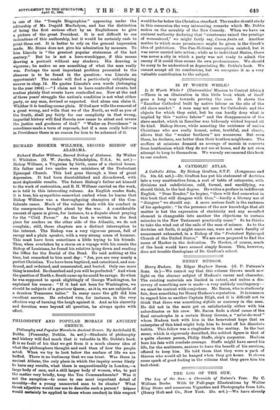RICHARD HOOKER WILLMER, SECOND BISHOP OF ALABAMA.
Richard Hooker Wiltmer, Second Bishop of Alabama. By Walter C. Whitaker. (G. W. Jacobs, Philadelphia, U.S.A. 8s. net.)— Bishop Willmer, a Virginian by birth, came of a clerical house. His father and two uncles were ministers of the Protestant Episcopal Church. This had gone through a time of great depression. It had been disestablished and disendowed, with most deplorable results. The future Bishop's father set himself to the work of restoration, and R. H. Willmer carried on the work, as is told in this interesting volume. An English reader finds, it is true, his sympathies somewhat curbed when he learns that Bishop Willmer was a thoroughgoing champion of the Con- federate cause. Much of the volume deals with his conduct in the emergencies brought about by the war. A considerable amount of space is given, for instance, to a dispute about praying for the "Civil Power." As the book is written in the first place for readers on the other side of the Atlantic, we do not complain; still, these chapters are a distinct interruption to the interest. The Bishop was a very vigorous person, full of energy and a plain speaker, with a very strong sense of humour. This must have been sometimes a little trying to his friends. Thus, when overtaken by a storm on a voyage with his cousin the Bishop of Louisiana, he found his relative lying down and reading the Office for the Burial of the Dead. He said nothing at the time, but remarked to him next day : "Joe, you are very nearly a perfect Christian. You have been baptised, and catechised, and con- firmed, and ordained, and consecrated, and buried. Only one more thing is needed. Be churched and you will be perfected." And when the question of North v. South came up he could be savage. So when he was supposed to speak slightingly of George Washington, he explained his reason : "If it had not been for Washington, we should be subjects of a gracious Queen; as it* we are subjects of a drunken Tennessee tailor." In many cases the gift did him excellent service. He rebuked vice, for instance, in the very effective way of turning the laugh against it. And as his sincerity and devotion were beyond all question, he always spoke with effect.






















































 Previous page
Previous page